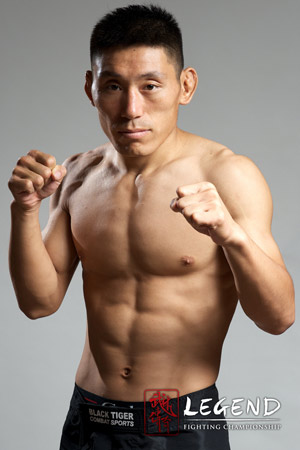 THE PEOPLE'S CHAMP
THE PEOPLE'S CHAMPOriginally published on Kung Fu Magazine, February 2012 , Translation assistance by Terence Yam and Joe Qiao Bo
China Top Team's Yao Honggang doesn't quite fit the profile of a champion fighter. As a bantamweight, he's on the small side, he's got funny ears, and he can't keep from cracking a smile. He's almost too polite and unassuming, at times blending into the crowd of people who want his autograph. It's because Yao came from that crowd that he is so humble. To support his family, he went out for work early in his life, and took as many jobs as he could: he was a cook, a night-shift guard, and even fixed air conditioners on skyscrapers (his only protection from falling off was one rope tied to his waist). And Yao wasn't fortunate enough to be a part of the state-sponsored athletics system; everything he's achieved has been of his own volition. Calling him "the people's champ" might sound cliché, but if anyone fits the profile, it's Yao Honggang.
While Yao's weathered face and kind eyes reflect years of sacrifice for his family, his heart and spirit reflect the reward he's received from sacrificing for his martial arts. A very short time after taking up the Chinese wrestling art of Shuai Jiao, he began competing and has since amassed a record of 47 wins in just over 50 fights, in regional, national and international televised tournaments. Yao's progression into Mixed Martial Arts competition has been equally rapid and stellar: he has shot through the Legend Fighting Championship's Bantamweight tournament to become the holder of the belt and the first Bantamweight Champion of the organization.
On February 11, Yao will have his first title defense. For his challenger, Legend FC has selected a very tough opponent and one with whom he is already familiar: Xian Sports University's Jumabieke Tuerxun. Bieke, as he's known, was Yao's opponent in his first MMA fight and handed Yao a dominating loss. While Bieke remains undefeated in all ten of his fights, Yao has shown a remarkable improvement in skill each successive time he has entered the ring. And coming directly from a UFC-sponsored month-long training camp in Las Vegas under many famous coaches, Yao is in prime position for this high stakes rematch.
Attesting to this seasoned competitor's composure, Yao took some time out of his training camp to discuss his Shuai Jiao background, his transition into MMA, and his thoughts on his upcoming title defense.
LL: I understand that you didn't start Shuai Jiao until you were 24. Were you interested in martial arts before then?
YH: Sure, I watched kung fu movies! When I was small, I watched movies like HUO YUANJIA, and JING WU MEN, Bruce Lee movies. Afterwards I would go someplace where nobody was and practice by myself. I've always been around sports because my dad is a physical education teacher.
LL: So did you start practicing another martial art before Shuai Jiao?
YH: No, I have lots of brothers, so there wasn't much money in our family; they couldn't pay for me to go to a martial arts school. I am the oldest brother, and responsible for helping my family, so I went to Beijing for work. But I kept exercising - stretching, pushups - and if I heard that someone practiced martial arts before, I'd ask them if I could learn. I got into Shuai Jiao when I found out a colleague of mine learned and introduced me to the teacher, Tong Yali Shifu of the Shuangcheng team.
LL: Since you'd never competed in combat sports, how did your first competition go?
YH: Actually, I only trained for about six months before my first competition. In my first match, I was very anxious, and my opponent open-palmed my face! I ended up beating him 9-0. I won three matches and lost one and got fifth place in all Beijing; I was happy because I'd never done anything like it before. I was given a medal by a famous wrestler. I thought, "One day I need to be a champ." But I need to work three months before I can save up enough money for training.
LL: Given the financial difficulty, how were you able to stay with it?
YH: Well, after a while, my shihing took me to a competition. I met a master from Shangxi who had a lot good fighters, and I became friends. Their school had many more students and higher standards, and they let me go train there for two months. Shangxi is like the hometown of Chinese wrestling. Of course I had to go back to Beijing to look for work and I got a job in a gym. Luckily the owner liked Shuai Jiao also, so we would wrestle a lot together. One day the famous wrestler Li Baoru, happened to be watching. He asked about my background, then invited me to train with him three times a week. I felt even luckier when he introduced me to the coach of the Xuanwu Sports School, Ma Jianguo. I was very happy to train with such a famous coach, and I studied with him for a year.
Attesting to this seasoned competitor's composure, Yao took some time out of his training camp to discuss his Shuai Jiao background, his transition into MMA, and his thoughts on his upcoming title defense.
LL: I understand that you didn't start Shuai Jiao until you were 24. Were you interested in martial arts before then?
YH: Sure, I watched kung fu movies! When I was small, I watched movies like HUO YUANJIA, and JING WU MEN, Bruce Lee movies. Afterwards I would go someplace where nobody was and practice by myself. I've always been around sports because my dad is a physical education teacher.
LL: So did you start practicing another martial art before Shuai Jiao?
YH: No, I have lots of brothers, so there wasn't much money in our family; they couldn't pay for me to go to a martial arts school. I am the oldest brother, and responsible for helping my family, so I went to Beijing for work. But I kept exercising - stretching, pushups - and if I heard that someone practiced martial arts before, I'd ask them if I could learn. I got into Shuai Jiao when I found out a colleague of mine learned and introduced me to the teacher, Tong Yali Shifu of the Shuangcheng team.
LL: Since you'd never competed in combat sports, how did your first competition go?
YH: Actually, I only trained for about six months before my first competition. In my first match, I was very anxious, and my opponent open-palmed my face! I ended up beating him 9-0. I won three matches and lost one and got fifth place in all Beijing; I was happy because I'd never done anything like it before. I was given a medal by a famous wrestler. I thought, "One day I need to be a champ." But I need to work three months before I can save up enough money for training.
LL: Given the financial difficulty, how were you able to stay with it?
YH: Well, after a while, my shihing took me to a competition. I met a master from Shangxi who had a lot good fighters, and I became friends. Their school had many more students and higher standards, and they let me go train there for two months. Shangxi is like the hometown of Chinese wrestling. Of course I had to go back to Beijing to look for work and I got a job in a gym. Luckily the owner liked Shuai Jiao also, so we would wrestle a lot together. One day the famous wrestler Li Baoru, happened to be watching. He asked about my background, then invited me to train with him three times a week. I felt even luckier when he introduced me to the coach of the Xuanwu Sports School, Ma Jianguo. I was very happy to train with such a famous coach, and I studied with him for a year.
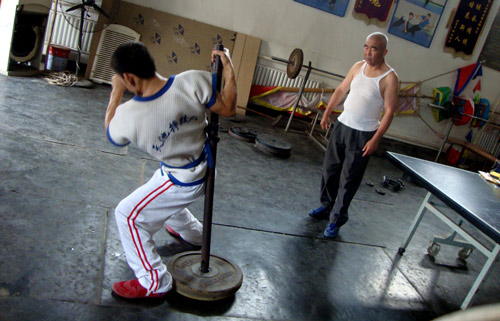
[Note: Masters Li Baoru and Ma Jianguo produced a 26-volume set of instructional DVDs on Shuai Jiao that were originally aired on CCTV.]
Then I found out a team had formed in Beijing called Tianchi. Li Baoru's student Zhou Quansheng was the coach so he introduced me to them. Zhou Shifu knows a lot of traditional styles - shooting arrows, swordsmanship, very traditional arts training - but he's known as being the champion of Shuai Jiao in China. The number three national champion started Tianchi because he wanted a team for his son to play on. We trained for free, and they were even able to give us a salary - as long as we keep getting better. [laughs] They just want us to pass on the art. After training there for about three months, I went to a competition in Beijing. It was difficult because I ended up facing my shihing and we both struggled really hard to win for two rounds. I finally became the champion!
LL: What are the basic rules of Shuai Jiao competition in China?
YH: Stay standing! [laughs] Each competition is two rounds of two minutes each. If you fall with your opponent, it's only one point. If you throw your opponent and remain standing, it's three points. If you trip your opponent then go down as well, it's two points. The play goes to nine points or to the end of both rounds.
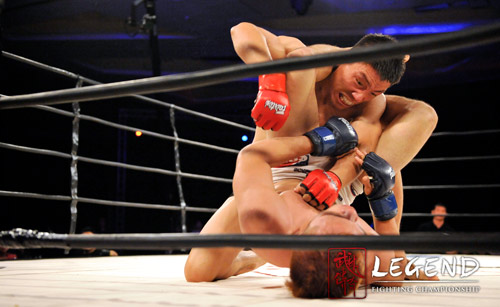
LL: You've won multiple championships including the Beijing Chinese Wrestling Championships, the Hebei Provincial Wrestling Championships, and the National Wrestling Tournament. Now in MMA you are the Legend FC Bantamweight Champion. Will you still compete in Shuai Jiao while you compete in MMA?
YH: I already have. In 2010 I won at the Hong Kong World Guoshu Festival, also the China World competition and the Beijing Sports Congress Wrestling competition and I was 60 kg champion at both.
LL: Do you know of Shuai Jiao practitioners or competitions outside of China?
YH: Yes, there are many. I know the US has a lot, and New Zealand. France has the most, I think. France has the Mayor's Cup; one of my teammates competed there.
LL: Your MMA ring name is "The Master," and now that you have many Shuai Jiao championships and an MMA title, I understand you are in demand as a teacher all over Beijing. When did you start teaching?
YH: After I won several championships, a student from the US joined our school. His conditioning wasn't that good and he couldn't follow our training, so after class I'd help him. Later he asked me to teach him; this was my first student. I'd like to teach my whole life, but I think later when I have the time, I would also like to study more wrestling styles. China has so many wrestling teachers who are good and have produced national champions; later I want to ask to study with them.
LL: What does your family think of your martial arts path?
YH: The same as any family: "Why don't you just work?" For me, there is no promise of what I can earn from working, and after all this time in competition, I have no clue how to do it. [laughs] I always think that my vision is right. My family is worried about my future, but I think I can give a good future to them.
LL: I understand one of your brothers has followed you into the martial arts. I read an interview in which your China Top Team shihing talked about your brother arriving at the gym before you once. Apparently you gave him the money to take the train, and you took the cheaper way by bus - that shows both humility and dedication. Can you talk about how your brother followed you into Shuai Jiao?
YH: Although my family didn't want to let him practice, my youngest brother really liked it. I said to him, "If you like it, then I will train you. So when he was 15 years old I brought him to Beijing and enrolled him in school. I was already in Tianchi, so we would train together on Saturdays. He's quicker than me, and the coaches really like him. Now he's also started to practice MMA. He's a blue belt in Brazilian Jiu Jitsu; our BJJ teacher especially likes him. I also pay for him to learn Muay Thai from a very famous coach we call Zhaka.
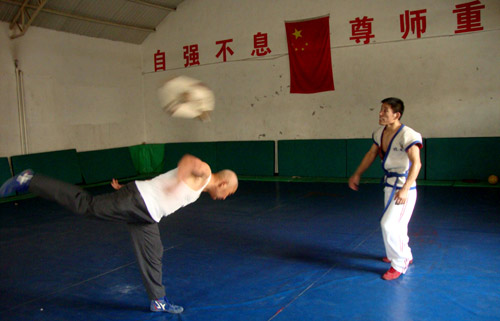
LL: What has driven you to study martial arts, even when you must work so hard and sacrifice so much?
YH: Wrestling and martial arts have really helped my life; I have met many good friends, it's changed my life style. I feel that the benefits to me are uncountable. And, I want to stand in the arena to fight. Then I want to see my own competition on TV and online. [laughs]
LL: How did you discover MMA and join CTT?
YH: In September of 2007 I learned about the Black Tiger Club. I was still learning Shuai Jiao and didn't have much time for MMA. A year later, after the national Shuai Jiao competition, I finally had the time to go there to learn BJJ and Muay Thai, but I could only go two times a week. I had a friend from New Zealand named Mike who studied with Li Baoru. Mike introduced me to Zhang Tiequan who brought me onto China Top Team. My BJJ instructor is CTT coachRuy Menezes and my Muay Thai coach is Vince Soberano Kaewsamrit.
LL: What are the differences between training in Shuai Jiao and training in MMA?
YH: Shuai Jiao is basically training the techniques, weights, and sparring two rounds. Now in MMA I must practice everything, BJJ, Muay Thai. MMA is three 5-minute rounds, so cardio is important; there is no time to rest or you will get beaten. I think the most important is BJJ, then wrestling, boxing, and Muay Thai.
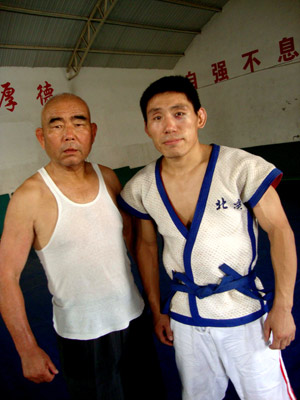 LL: What does your Shuai Jiao master think about your practice of MMA?
LL: What does your Shuai Jiao master think about your practice of MMA?YH: At first my teacher didn't agree, he felt it was too violent. Now he wants me to train harder and get better results. [laughs]
LL: Does Shuai Jiao help your MMA fighting?
YH: It's a very big help! I usually fake a punch and throw them. If they try to defend, then I fake a throw and punch them. [laughs]
LL: Your first MMA fight was a loss; what were your feelings?
YH: At that time I knew that my stand-up game wasn't enough, that if I couldn't throw him I won't win, and my cardio at that time was insufficient.
LL: Obviously you learned from that, because you went on to win your next four fights. Your sixth fight was against a veteran of Art of War and Martial Combat, Jiang Longyun, and you lost to him by doctor stoppage. It is difficult getting news of these fights outside of China; what actually happened?
YH: China's MMA competition has been progressing, and the technology slowly must become more comprehensive. Eight days before my fight, my brother broke his collar bone, so I had to go with him to surgery and couldn't train. Then right before, I hurt my eye. My coach said, "Your conditioning's not good, your eye is now hurt, don't go." But I was thinking I must, I want to win and get the money for my brother for the hospital. My opponent already knew my eye was hurt so he attacked it. I tried to finish the first round, but the doctor stopped it. I think the referees need more training.
LL: Your first fight in Legend FC was against an Australian fighter from the strong camp Integrated MMA with a record of 12-3, Mick Mortimer. What was your strategy for defeating him?
YH: I wanted to throw him down and submit him.
LL: When you fought Nam Jinjo for the Bantamweight title, you were coming in as the underdog - even your teammates later admitted they were concerned because of the Korean's training at Team MAD. What was your strategy for winning the belt?
YH: I thought that in wrestling, I definitely didn't fear him, and since he's smaller, definitely does not have the strength. So I wanted to look for the opportunity to throw him down and ground and pound him.
LL: Has your life changed since you won the belt?
YH: More people know me now, recognize me and my achievement. Also I teach more classes. For these things, I have to thank everyone who has helped me.
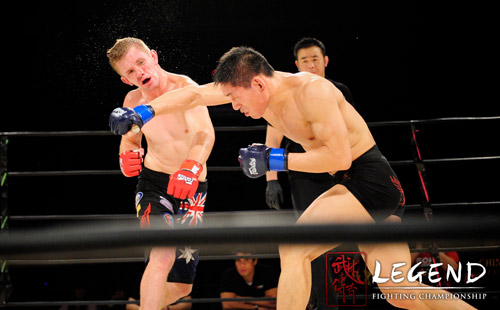
LL: The UFC has been trying to gain inroads into China for several years, and its latest campaign included selecting several top MMA athletes from China and sponsoring them to train in prominent US gyms for a month. You were one of the athletes selected to go to Las Vegas, and lucky that it coincided with your fight camp pre-title defense. Who were you able to train with?
YH: We trained at Wanderlei Silva's gym and others. They were very, very high standard, there were quite a few black belts. I trained with two MMA coaches and a strength coach. Also there was a BJJ trainer named Fredson Paixao who is many times a world champ and a UFC fighter. We also boxed with the famous trainer Jimmy Gifford, who coached many UFC champs.
LL: Do you feel it gives you an advantage to have the experience as your pre-fight training camp?
YH: YES.
LL: What was your impression of the differences in how MMA fighters train there versus in China?
YH: They have many side coaches, and many athletes; the training level is high, the athlete level is also high. The strength training is also quite scientific. The new technologies are many.
LL: Do you think Chinese and Asian MMA can rise to the level of the western countries?
YH: Definitely, so long as there are good teachers, good training, and we train together with good athletes.
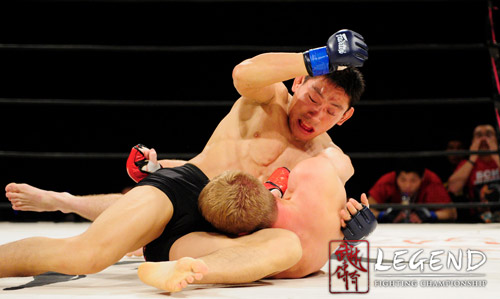
LL: How do you feel about being the first Legend FC Bantamweight Champion?
YH: I feel that my luck has been good, but I must continue to improve. I must work harder to build up my weaknesses.
LL: How do you feel about meeting Tuerxun as your first opponent for your defense, given that he was your first loss?
YH: I don't think much. Just give me anyone. I listen to the promoter.
LL: What have you improved that will make you able to defeat him this time?
YH: My boxing and BJJ. I have the skills to take away anything he has.
LL: How do you see the fight happening?
YH: If I perform well, I will grab the chance and submit him in the first round
LL: Is there anyone you would like to thank?
YH: I would like to thank everyone on my team, and the UFC for giving me this overseas training opportunity.

No comments:
Post a Comment